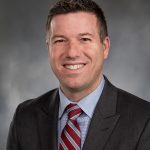Senator has ideas for more efficient, open lawmaking – and maybe less overtime
 EAST WENATCHEE… Coming off another legislative session that went into extra innings, Sen. Brad Hawkins wants to talk about modernizing the session schedule to help lawmakers make the most of their limited time to meet at the state Capitol.
EAST WENATCHEE… Coming off another legislative session that went into extra innings, Sen. Brad Hawkins wants to talk about modernizing the session schedule to help lawmakers make the most of their limited time to meet at the state Capitol.
“I respect our traditions but think it’s very reasonable to consider adjusting the session timeline to reflect today’s more complex workload and help us handle that work more efficiently and transparently. It may even create opportunities to significantly reduce the number of special sessions,” said Hawkins.
The 12th District senator served through three special sessions this year, on top of six overtimes during his four years in the House of Representatives. He plans to spark the discussion by filing two measures in December, ahead of the 2018 legislative session that will start Jan. 8 and is scheduled for 60 days.
One proposal would simply change state law to move each session’s opening day to the first Monday of February, instead of the second Monday in January. His second measure, a Senate joint resolution, would remove “consecutive” from the part of the state constitution that defines the Legislature’s regular sessions as 60 or 105 consecutive days.
Counting the days consecutively means the session clock continues to run on weekends, when many legislators return to their districts. Although they’re able to connect with constituents and continue working on issues, Hawkins noted, being away from the Capitol means less time for formal actions on legislation. The practice effectively costs the Legislature about 30 of the 105 consecutive workdays allotted during a budget year.
“I think my bill to move the start of the session to early February makes a lot of sense,” said Hawkins. “Stakeholders and constituents would have more time to connect with their legislators – especially new legislators – after elections and winter holidays, and it would help those newly-elected legislators make a smoother transition.
“Moving into a new office, going to your committees for the first time, drafting legislation, and taking multiple office visits all in the same week can be chaotic. The best part is that nothing in my bill would change when legislators take their oaths of office or start their terms. What would change is the start date of the session,” Hawkins said.
“The only date that seems to drive anything anymore is June 30, which is the end of the state’s fiscal biennium, for the budget years. Starting a bit later won’t be a setback. It will just get us closer to what has become the real deadline,” he added. His proposal would require approval from a simple majority in the Senate and House and the governor’s consent.
He added that winter travel conditions are also likely to be better beginning in February for constituents who venture to the Capitol to participate in the legislative process as well as lawmakers who return to their districts on weekends.
“Let’s avoid three weeks of very difficult weather and spare folks some winter travel,” said Hawkins.
Hawkins said creating more flexibility for the 60 and 105 session days in Article II, Section 12 of the state constitution could effectively give lawmakers more time within a regular session to develop and reach bipartisan agreement on major legislation, especially budgets. That in turn would mean more opportunities for the public to offer input than an overtime period typically offers.
Also, he said, legislators could set aside time in the calendar for in-district work periods to hear from constituents, or breaks for budget negotiations at stages during the longer sessions. To amend the constitution, his proposal would need approval from two-thirds of Senate and House members to qualify for the November 2018 general-election ballot, then receive support from a simple majority of voters.
“Being able to hit the pause button on the session clock so legislators can go home and get feedback from their constituents would automatically help make the legislative process more transparent, especially before casting major votes. Also, our regular sessions are better structured for transparency and public participation than special sessions. The flexibility to apportion our regular session days differently could greatly reduce or potentially eliminate what has become the common practice of calling multiple special sessions,” Hawkins said.
Hawkins said it does not matter whether his policy proposals are considered separately or together – but he hopes they will receive strong consideration in light of the frustration felt on both sides of the political aisle and from the public when the Legislature goes into extra sessions.
“I don’t know exactly where the conversation will go, but I am ready to get it started. Beginning our sessions in early February makes sense for many reasons, and we should also either strike the word ‘consecutive’ in the constitution or consider expanding the number of session days to something greater than 105 and 60,” said Hawkins.
“Let’s not kid ourselves: the size, scope, and challenges of our state economy and budget are certainly different from many years ago. The job of being a legislator already has year-round responsibilities and expectations, so it’s reasonable to talk about adjusting the session structure to acknowledge that reality. I think both legislators and the public would benefit from a more predictable and feasible schedule. It’s time to have a thoughtful discussion about our session timing and structure,” said Hawkins.










